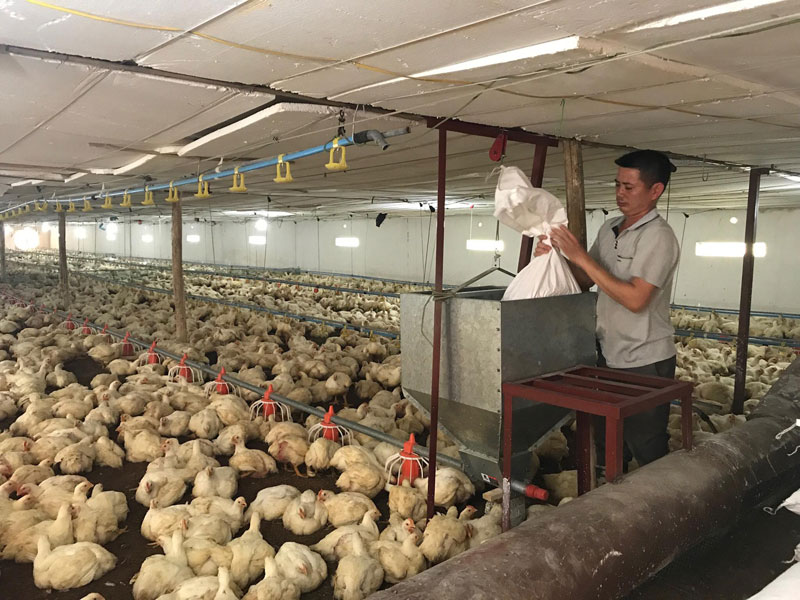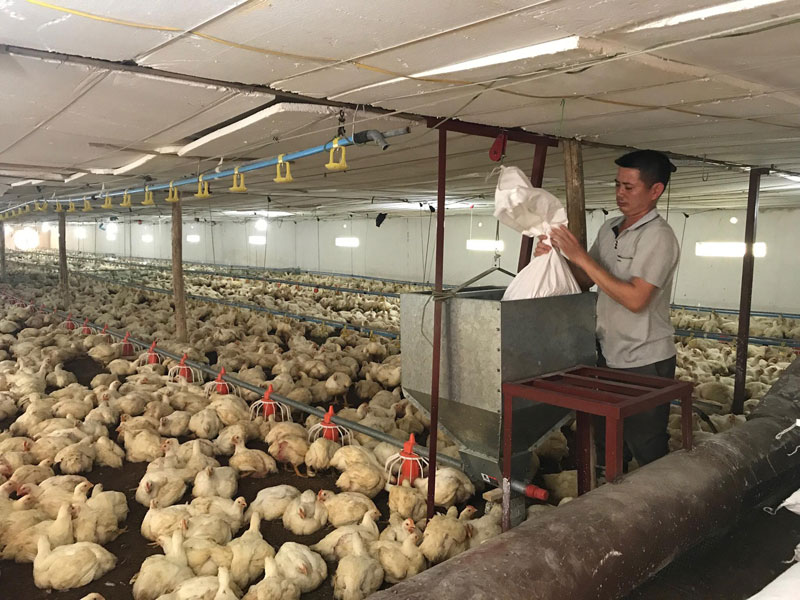
(HBO) – In recent years, An Binh Commune (Lac Thuy) has formed many models of farming economy and household farming for high and stable incomes. These models are increasingly expanding and developing, contributing to the local people's income, promoting the local advantages, increasing the competitiveness of mechandises in the market.

Dinh Ngoc Vung’s Japfa White Chicken Raising
Farm, Cay Ruong Village, An Binh Commune (Lac Thuy) brings the income of
300-400 million VND per year.
The whole commune has nearly 100 models of
farming economy, household farming from small to large scale. Poultry farming
is a local strength with a total of 220,000 animals. There are 63 household
farms raising Lac Thuy small chickens with the size of about 500 chickens per
farm; 11 Japfa white chicken raising farms with the scale of more than 10,000
chickens per farm. Especially, there are 4 chicken farms which are granted with
the certificate of average income of over 525 million VND per year by the District
People’s Committee. In the commune, there appeared many good and typical
farmers such as Mr. Bui Dong Giang (An Son 1 village) with small chicken farms
which brings 1 billion VND per year; Mr. Bui Van Chung (Ninh Ngoai village)
with raising small chicken model for the income of 700-800 million VND per
year; Mr. Dinh Ngoc Vung (Cay Ruong village) with the model of raising Japfa
white chicken, which brings the income of 300-400 million VND per year; Mr.
Dinh Van Binh with 2,000 small chicken farm, earning 100-150 million VND per
year, etc.
Visiting Mr. Dinh Ngoc Vung’s Japfa raising
white chicken farm, he said, "Developing a farm model gave my family a high and stable economic
productivity. Thanks to the good use of all the loan resources, bold investment
in production, applying science and technology in breeding, strict compliance
with regulations on food hygiene and safety, the model of raising 8,000 white
chicken brings the income for the family from 300-400 million VND per year
".
To make full use of the potential land of the
hills and forests with animal husbandry, towards building the brand of clean
products, the number of livestock raised in the commune has developed in terms
of scale and quality. Currently, the total number of buffaloes in the commune
is 1,573, up to 103.2% in comparison with the same period; the number of goats
has gone up to 1.616, 616 goats higher compared with 2016. The poultry number
has increased remarkably with nearly 220,000 animals, reaching at 332.7% over
the same period. In addition, the local people in the commune began to develop
and multiply the model of raising honey bee up to 928 herds, which is estimated
to reach at 6.5 tons of honey per year.
According to data from the Hoa Binh Provincial Party Committee, the industrial production index for the first six months of 2025 is estimated to have increased by 20% compared to the same period last year. This marks the highest year-on-year growth rate for this period since 2020.
In the first six months of 2025, Hoa Binh province’s export turnover was estimated at 1.145 billion USD, marking an 18.11% increase compared to the same period in 2024. Import turnover was estimated at $ 804 million, a 17.15% increase, which helped the province maintain a positive trade balance.
The lives of the ethnic minority farmers in Tan Lac district have gradually improved thanks to the new directions in agricultural production. This is a testament to the collective strength fostered through the professional associations and groups implemented by various levels of the district’s Farmers’ Union.
With the motto the "product quality comes first,” after nearly one year of establishment and operation, Muong village’s Clean Food Agricultural and Commercial Cooperative, located in Cau Hamlet, Hung Son Commune (Kim Boi district), has launched reputable, high-quality agricultural products to the market that are well-received by consumers. The products such as Muong village’s pork sausage, salt-cured chicken, and salt-cured pork hocks have gradually carved out a place in the market and they are on the path to obtaining the OCOP certification.
In the past, the phrase "bumper harvest, rock-bottom prices" was a familiar refrain for Vietnamese farmers engaged in fragmented, small-scale agriculture. But today, a new spirit is emerging across rural areas of Hoa Binh province - one of collaboration, organisation, and collective economic models that provide a stable foundation for production.
Maintaining growing area codes and packing facility codes in accordance with regulations is a mandatory requirement for agricultural products to be eligible for export. Recently, the Department of Agriculture and Environment of Hoa Binh province has intensified technical supervision of designated farming areas and packing facilities to safeguard the "green passport" that enables its products to access international markets.



